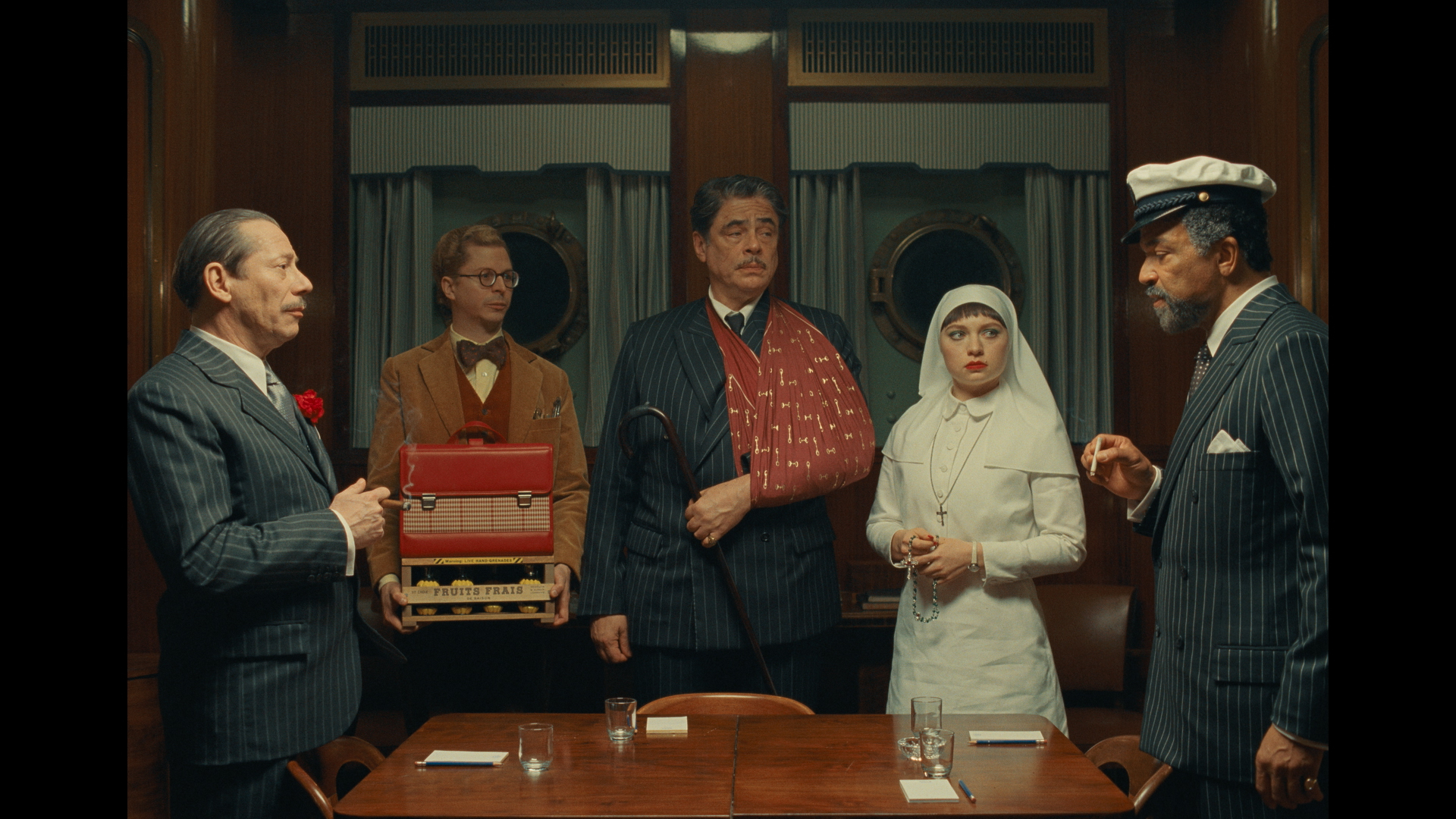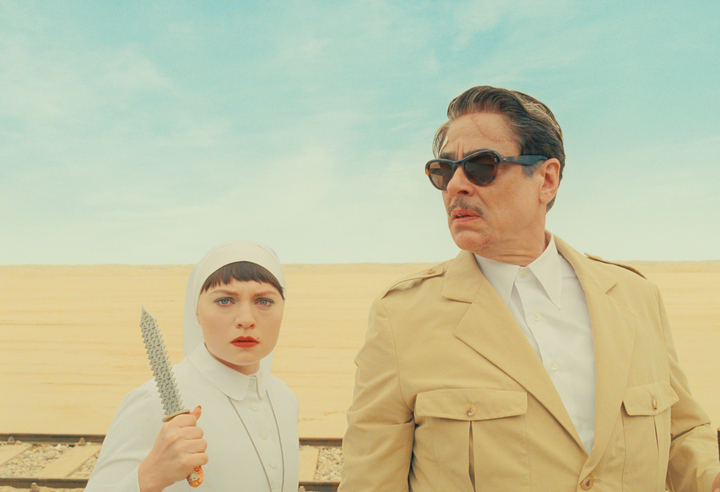Director: Wes Anderson
Writer: Wes Anderson
Stars: Benicio del Toro, Mia Threapleton, Michael Cera
Synopsis: Wealthy businessman Zsa-zsa Korda appoints his only daughter, a nun, as sole heir to his estate. As Korda embarks on a new enterprise, they soon become the target of scheming tycoons, foreign terrorists, and determined assassins.
“Myself, I feel very safe.” That’s what Zsa-zsa Korda (Benicio del Toro) tends to tell himself moments before potential disaster, when everyone around him has reason to panic. A ticking time bomb that was covertly hidden under his private plane’s lunch trolley? No bother, it shouldn’t go off before he and his companions reach the tarmac. A catastrophic engine failure that requires a forced landing, one that his pilot is reasonably anxious about performing? Good thing Korda, an infamous international businessman and one of the richest men in Europe, is a capable aviator himself. (Perhaps it’s no coincidence that a number of these crises unfold while he floats among the clouds.) A global project that he has been nurturing for years and could feasibly set the wheels of global commerce in motion anew is suddenly in jeopardy of losing its financing? More complicated than a plane crash – he has survived six – but for a master negotiator such as himself, Korda’s ability to convince his financiers to fork over a bit more dough should be as easy as taking candy from a baby. He’s a man of endless means, after all, despite the fact that practically everyone he’s ever communicated with wants him dead. “I’m still in the habit of surviving,” he notes following the first aerial accident we see him escape with but a few minor-ish injuries, despite the fact that, in his glib phrasing, he keeps getting assassinated. If anyone should feel safe in times of trouble, it’s probably the man with this much luck on his side.
This idea of feeling safe amidst logical uncertainty also happens to make a lot of sense for audiences taking in a new film from Wes Anderson, the auteur whose style has become more recognizable with every passing feature, arguably to the point of being overdone. He strokes a familiar, comforting brush when he paints, making art that you might feasibly say you’ve seen before, only what you really mean is that you’ve seen something only slightly similar. While each of Anderson’s films look, sound, and feel analogous on their surface – singularly and intricately designed by a mad diaramist with an infinite toolbox – there’s newfound magic aplenty to what Anderson achieves in each work of art, and the fresh stories he tells while maintaining his elegant, orderly technique.
Zsa-zsa Korda, the main character in his latest journey, The Phoenician Scheme, is the ideal Andersonian archetype, a wealthy, idiosyncratic man who has a complicated relationship with his many children and a particular goal in mind, one that serves as the film’s engine. This objective, one that quickly transforms from an ambitious business venture into a madcap caper, fits squarely in the narrative realm its writer-director has been operating within for the better part of three decades. Its thematic dressing is a slightly newer presence in Anderson’s filmography, though viewers of his two most recent films – 2021’s The French Dispatch and 2023’s Asteroid City – will clock The Phoenician Scheme’s poignancy from a mile away and still appreciate the trip that is required to get to its heart. Most, if not all of his films are cut from the same cloth, but every individual creation exists unto itself.

The Phoenician Scheme is no exception, and not only because it feels as though Anderson saw the heartfelt responses to his two preceding features and asked, “What if that tone, but funnier and bloodier?” Of course, that simply means that there will be a bounty of sight gags, glorious quips, and gunfire aplenty, but it’s Scheme’s heartwarming spirit that should still be the primary draw. The film doesn’t fully set off on its globe-trotting excursion until Korda is reunited with his only daughter, Liesl (Mia Threapleton), who he hasn’t seen in six years, not since sending her to a convent where she would become a nun. He didn’t necessarily want her to become religious; he just figured it was safer than living in his chaotic transactional world.
Korda has sent for her in order to will his estate to her in the event of his inevitable, albeit untimely death, a prospect that comes with a fortune as sizable as Liesl’s doubts, given she and her father’s self-induced estrangement. Nothing a quick prayer can’t fix, though, and after confiding in the Lord, Liesl agrees to work with Zsa-zsa on a trial basis, one that she intends to use as proof that she belongs in the convent. Thus, their adventure begins, and because Anderson is nothing if not a filmmaker who loves to employ a vast ensemble, Korda’s entomology tutor, Bjørn (Michael Cera), tags along.
As the trio’s travels ensue, so, too, does the United Nations’ concerted effort to bring Korda down once and for all, as his dealings in international markets have caused a great deal of turmoil between a number of international countries. Led by Rupert Friend, this U.N. task force has been fudging prices for the materials Korda requires to complete his next enterprise, a collection of profit-maximizing channels across six separate locations in the territory formerly known as Phoenicia. In order to balance the cost, Korda (with Liesl and Bjørn’s assistance) has to negotiate the reduction of “the gap” with the other involved parties: the mousy Prince Farouk (Riz Ahmed), railroad barons Leland and Reagan (Tom Hanks and Bryan Cranston, respectively), the nightclub-owning Marseille Bob (Mathieu Amalric), the fast-talking ship captain Marty (Jeffrey Wright), and Korda’s cousin, Hilda (Scarlett Johansson), who has been tasked with heading up construction of a dam at the center of the whole operation. Uncle Nubar (Benedict Cumberbatch, sporting one hell of a beard) is the biggest obstacle of all, and is a significant figure in Korda’s past to boot. But the numbers they’re all negotiating don’t matter nearly as much as the journey to each destination, as The Phoenician Scheme is as much a road movie as it is an action-comedy, and combining those two genres makes for a blissfully entertaining romp that only Anderson could devise.

Zsa-Zsa Korda, Mia Threapleton as Liesl, and Jeffrey Wright as Marty in director Wes
Anderson’s THE PHOENICIAN SCHEME, a Focus Features release.
Courtesy of TPS Productions/Focus Features © 2025 All Rights Reserved.
And while said romp tends to get a bit distracted by the plethora of schemes hiding within its titular one, it’s a fitting quality, given its protagonist’s own inability to handle one thing at a time, and certainly his struggles with keeping it all in order. “If something gets in your way, flatten it,” Korda tells Liesl, nevermind that it was the advice his own father gave him before he cut Zsa-zsa out of his will. That’s not an idea that one might typically associate with Anderson, though maybe that’s because “flatten” is the term used and not “escape.” The latter has been far more present throughout his career, from 1996’s Bottle Rocket to his masterpiece, 2014’s The Grand Budapest Hotel, and beyond. In each, someone (or multiple someones) spend a great deal of time running from something, attempting to evade capture and narrowly succeeding.
The same happens in The Phoenician Scheme, but with another obsession of Anderson’s working its way into the foreground: How these dire straits bring people closer together. Who better to pair in this particular scenario than a father and a daughter –The Royal Tenenbaums, anyone? – with del Toro delightfully inhabiting the role of the pompous puppet master who softens up over time, and Threapleton turning in a breakout performance as the kid he once left behind for bigger and better things. Her understanding that emotions need not always be plastered on an actor’s face is the smartest casting-related revelation, perhaps only surpassed by how at home the Anderson first-timing Cera is in this quirky world. He’s a riot and a natural, and is thankfully given a part that expands far beyond the trappings that Bjørn’s accent might suggest.

In terms of its action, The Phoenician Scheme’s violence serves as Anderson’s most overt use of combat to date, but it’s treated with a slickness that is at home here as it would be in a Monty Python tale. (Gunshot wounds tend to be met with “Tis just a flesh wound” type responses.) Yet the scales are always cleverly balanced out by how other characters look at Zsa-zsa after he’s thrown himself in harm’s way on their behalf. Furthermore, when Korda is severely wounded, Anderson alters his aspect ratio to Academy and shifts to heavenly tableaus where his main character dreams of God (Bill Murray) and others from his past, as if he’s briefly ascended to the afterlife. Shot in black and white (which cinematographer Bruno Delbonnel previously mastered in Joel Coen’s The Tragedy of Macbeth), these brief departures from the reality Anderson has molded are among his deepest constructions to date, and allow for real-time introspection about what exactly he might be getting at with this particular piece.
They occur infrequently and are relatively brief, but these interludes feel more in line with Phoenician’s grand scheme than they appear at first blush. “Somewhere along the line, we realize this guy is being confronted with his own death so aggressively and overtly that it’s actually starting to change his view of the world,” Anderson told Vulture’s Bilge Ebiri in a recent interview. “Which is not something he’s ever been open to. And what he’s learning in those moments I guess he’s learning from himself.” As the audience learns along with Korda – about life, death, legacy, regret, and love – there’s a chance they’ll be hesitant, given what much of The Phoenician Scheme has presented itself to be. It would be a mistake. Like Asteroid City and the rest of Anderson’s body of work before it, something deeper is at play. You just have to look beyond the pristine scenery to find it.





